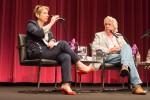As Ukrainian and Russian officials met in Berlin Wednesday to negotiate peace between the two nations, two panelists at the UCLA Hammer Museum discussed causes and ramifications of the now months-long conflict between the countries.
The panel discussion, called “Putin’s New World Order,” featured Nina Khrushcheva, great-granddaughter of former Soviet leader Nikita Khrushchev, and Robert English, an international relations professor at USC who studies Russia. The forum, moderated by journalist Ian Masters, discussed Putin’s diplomacy and military actions.
Khrushcheva, whose great-grandfather is known for giving Crimea to Ukraine in 1954, said she thinks the conflict originated from Russia’s desire to display its power and that Russian President Vladimir Putin has used the conflict as propaganda. She added that she thinks the conflict is similar to past events.
“If you look at Russian history, Russia is always (calling itself) a victim,” Khrushcheva said. “The conflict perpetuates Putin’s regime … because all the nationalistic ‘us against the world’ mentality has really been working fine for Putin’s approval numbers.”
Both speakers cautioned that people should not view the conflict in a simplistic way or compare Putin directly to Hitler.
“Many of the popular arguments we hear … are patently ridiculous,” English said. “They leave out a point not found on the simple line.”
The recent conflict began with a series of mass protests in Ukraine in February, after Ukrainian President Viktor Yanukovych abandoned a partnership agreement with the European Union to seek closer ties with Russia. When Ukrainians overthrew Yanukovych, Putin ordered Russian troops to move into Crimea, a multiethnic region at the southern edge of Ukraine that contains a large ethnic Russian population. Putin said he did this to protect the ethnic Russian minority in the region.
In March, an overwhelming majority of the Crimean population voted in a referendum for the region to once again be part of Russia. The United States did not recognize the vote because it claimed Russia had created a hostile environment for those who disagreed with the referendum.
Pro-Russian rebels – mostly in eastern Ukraine – and the Ukrainian government have been involved in military battles for months, as rebels have taken control of several Ukrainian military bases.
At the panel, English disagreed with Khrushcheva on the origin of the conflict, saying it came as a response to anti-Russian policies from Western nations such as the United States. English said he thinks U.S. decisions, such as the invasion of Iraq in 2003 and the change of regime to overthrow Libyan leader Muammar Gaddafi in 2011, ignored the security of Russia and Putin.
“By 2004, (the reformist, pro-Western) Putin was gone,” he said, mentioning many reforms Putin tried to initiate in the early part of his presidency such as implementing a flat tax system. “He was more interested in his political wealth and glory.”
Masters said he thinks Putin has played his hand well even with less resources than the United States. Masters added that he thinks Putin has successfully portrayed victims of his acts as the enemy, while avoiding further sanctions.
In one panel question, Khrushcheva talked about the role Ukrainians could play in the conflict. She said she thinks Ukraine can serve as a model for Russia in bringing democracy to the nation, though she added that Russia’s size does not make it a suitable environment for reforms.
“In Russian history, it all starts well and ends badly,” she said. “When you sit in the Kremlin, the power corrupts you.”
English expressed skepticism about whether the revolution will actually lead to positive change, saying he thinks Eastern Ukraine may suffer because of the region’s heavy economic relationship with Russia.
“Where do you think the pain is going to come?” he asked. “Who is going to replace Russia (as the place to export goods)?”
After observing a 10-day ceasefire that ended Monday, the Ukrainian government has ordered its forces to attack pro-Russian rebels. It is not clear when another ceasefire will be reached.
